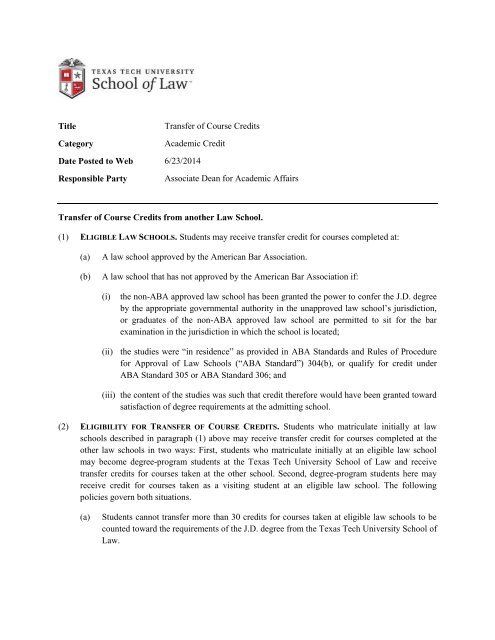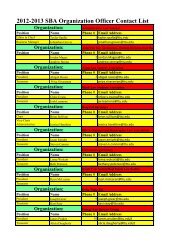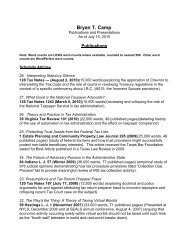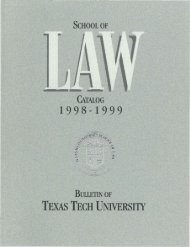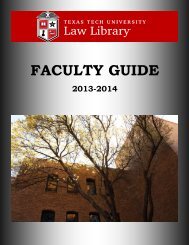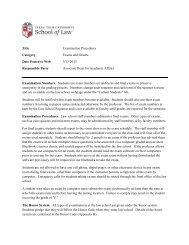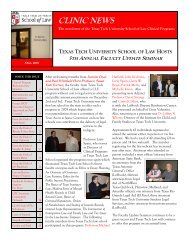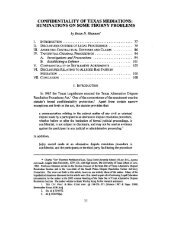Transfer Credits - Texas Tech University School of Law
Transfer Credits - Texas Tech University School of Law
Transfer Credits - Texas Tech University School of Law
Create successful ePaper yourself
Turn your PDF publications into a flip-book with our unique Google optimized e-Paper software.
Title<br />
Category<br />
<strong>Transfer</strong> <strong>of</strong> Course <strong>Credits</strong><br />
Academic Credit<br />
Date Posted to Web 6/23/2014<br />
Responsible Party<br />
Associate Dean for Academic Affairs<br />
<strong>Transfer</strong> <strong>of</strong> Course <strong>Credits</strong> from another <strong>Law</strong> <strong>School</strong>.<br />
(1) ELIGIBLE LAW SCHOOLS. Students may receive transfer credit for courses completed at:<br />
(a)<br />
(b)<br />
A law school approved by the American Bar Association.<br />
A law school that has not approved by the American Bar Association if:<br />
(i)<br />
the non-ABA approved law school has been granted the power to confer the J.D. degree<br />
by the appropriate governmental authority in the unapproved law school’s jurisdiction,<br />
or graduates <strong>of</strong> the non-ABA approved law school are permitted to sit for the bar<br />
examination in the jurisdiction in which the school is located;<br />
(ii) the studies were “in residence” as provided in ABA Standards and Rules <strong>of</strong> Procedure<br />
for Approval <strong>of</strong> <strong>Law</strong> <strong>School</strong>s (“ABA Standard”) 304(b), or qualify for credit under<br />
ABA Standard 305 or ABA Standard 306; and<br />
(iii) the content <strong>of</strong> the studies was such that credit therefore would have been granted toward<br />
satisfaction <strong>of</strong> degree requirements at the admitting school.<br />
(2) ELIGIBILITY FOR TRANSFER OF COURSE CREDITS. Students who matriculate initially at law<br />
schools described in paragraph (1) above may receive transfer credit for courses completed at the<br />
other law schools in two ways: First, students who matriculate initially at an eligible law school<br />
may become degree-program students at the <strong>Texas</strong> <strong>Tech</strong> <strong>University</strong> <strong>School</strong> <strong>of</strong> <strong>Law</strong> and receive<br />
transfer credits for courses taken at the other school. Second, degree-program students here may<br />
receive credit for courses taken as a visiting student at an eligible law school. The following<br />
policies govern both situations.<br />
(a)<br />
Students cannot transfer more than 30 credits for courses taken at eligible law schools to be<br />
counted toward the requirements <strong>of</strong> the J.D. degree from the <strong>Texas</strong> <strong>Tech</strong> <strong>University</strong> <strong>School</strong> <strong>of</strong><br />
<strong>Law</strong>.
(b) Only the credits for courses taken at another law school will be recorded on a student’s <strong>Texas</strong><br />
<strong>Tech</strong> <strong>University</strong> transcript. The grades for these courses will not be recorded on the student's<br />
transcript and will not be used to compute the student's cumulative grade point average at the<br />
<strong>Texas</strong> <strong>Tech</strong> <strong>University</strong> <strong>School</strong> <strong>of</strong> <strong>Law</strong>.<br />
(c)<br />
(d)<br />
(e)<br />
(f)<br />
(g)<br />
The credit for a course taken at another law school will not transfer unless the student<br />
receives a grade for the course at or above that law school’s grade point average required for<br />
graduation. If the other law school requires a “C” cumulative grade point average for<br />
graduation, for example, and the student receives a passing grade lower than a “C” (e.g.,<br />
“D+”), credit for that course will not transfer.<br />
The credit for a course at another law school graded on a pass-fail basis typically will not<br />
transfer. The Associate Dean for Academic Affairs may authorize the transfer <strong>of</strong> credit for a<br />
course graded on a pass-fail basis if the instructor for that course certifies that the student<br />
would have received a grade at or above the school’s grade point average required for<br />
graduation had the course been graded on a basis other than pass-fail.<br />
Students cannot receive credit for courses taken at another law school and at the <strong>Texas</strong> <strong>Tech</strong><br />
<strong>University</strong> <strong>School</strong> <strong>of</strong> <strong>Law</strong> in the same subject. The Associate Dean for Academic Affairs will<br />
determine whether a particular course violates this rule.<br />
If a student has completed a course at another law school in a subject required for graduation<br />
at the <strong>Texas</strong> <strong>Tech</strong> <strong>University</strong> <strong>School</strong> <strong>of</strong> <strong>Law</strong> but the credit is less than the amount required for<br />
graduation here, the Associate Dean for Academic Affairs may designate another course in<br />
the subject area that the student can take to satisfy the graduation requirement if the credits<br />
for the original course and the additional course meet or exceed the credits required. A<br />
transfer student must register for substitute courses in his or her first year at the <strong>Texas</strong> <strong>Tech</strong><br />
<strong>University</strong> <strong>School</strong> <strong>of</strong> <strong>Law</strong> which, if completed successfully, will meet graduation<br />
requirements in that subject. If the Associate Dean is not able to designate a substitute course<br />
from the curriculum in the transfer student’s first year here, that student must take the <strong>Texas</strong><br />
<strong>Tech</strong> <strong>University</strong> course in that subject.<br />
A degree-program student at <strong>Texas</strong> <strong>Tech</strong> wishing to transfer credit for courses at another law<br />
school must obtain permission from the Associate Dean for Academic Affairs before<br />
enrolling in the courses. The student must file a “Request to <strong>Transfer</strong> Credit for Courses from<br />
Another <strong>Law</strong> <strong>School</strong>” form before enrolling at the other law school. If the student is unable to<br />
register for the courses for which he or she has permission, the student must file an amended<br />
“Request to <strong>Transfer</strong> Credit” form to reflect the new course selections.<br />
Distance Education Courses. Students may transfer up to 12 credits for courses taken by distance<br />
education from another ABA-approved law school. <strong>Transfer</strong>ring credit for distance education courses is<br />
subject to the 30 credit limit for all transfer credits, as well as the enrollment limit <strong>of</strong> 18 credits in a fall or<br />
spring semester and the limit <strong>of</strong> 11 credits in a summer semester.
Semester Abroad Programs. To be eligible to participate in such a program, students must maintain a<br />
cumulative grade point average <strong>of</strong> 2.000 or higher for ABA-approved summer law programs or 2.500 or<br />
higher for our semester abroad exchange programs. In addition, students may not be on scholastic<br />
probation. Enrollment in such programs is limited, so the Associate Dean for International Programs may<br />
impose additional academic requirements when necessary.<br />
Other <strong>University</strong> Departments. Students not in a dual-degree program may earn up to six hours credit<br />
toward the 90-credit hour requirement for the J.D. degree for graduate courses <strong>of</strong>fered by <strong>Texas</strong> <strong>Tech</strong><br />
<strong>University</strong> provided that such courses have been approved by (i) the faculty as part <strong>of</strong> a dual-degree or<br />
Concentration program, or (ii) the Dean or the Dean=s designee, which designee may be an Associate<br />
Dean or a faculty committee.<br />
Grades earned in such graduate courses are not calculated as part <strong>of</strong> the law school GPA nor do they<br />
factor into class ranking.


